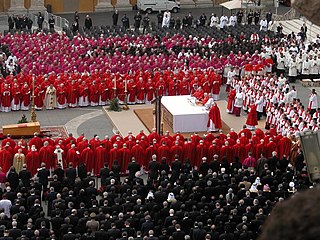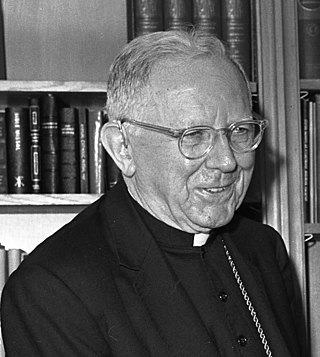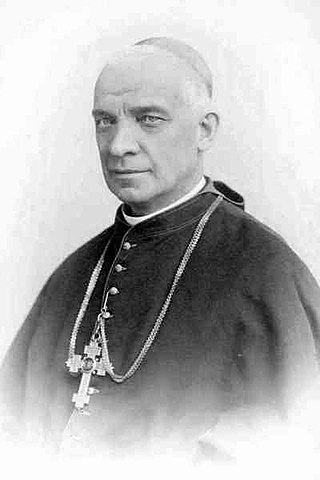Pope Agapetus I was the bishop of Rome from 13 May 535 to his death. His father, Gordianus, was a priest in Rome and he may have been related to two popes, Felix III and Gregory I.
The Primacy of Ireland belongs to the diocesan bishop of the Irish diocese with highest precedence. The Archbishop of Armagh is titled Primate of All Ireland and the Archbishop of Dublin Primate of Ireland, signifying that they are the senior clerics on the island of Ireland, the Primate of All Ireland being the more senior. The titles are used by both the Catholic Church in Ireland and Church of Ireland. Primate is a title of honour, and in the Middle Ages there was an intense rivalry between Armagh and Dublin as to seniority. The Archbishop of Armagh's leading status is based on the belief that his see was founded by St. Patrick, making Armagh the ecclesiastical capital of Ireland. On the other hand, Dublin is the political, cultural, social, economic and secular centre of Ireland, and has been for many centuries, thus making the Archbishop of Dublin someone of considerable influence, with a high national profile. The dispute between the two archbishoprics was settled by Pope Innocent VI in 1353, with occasional brief controversy since. The distinction mirrors that in the Church of England between the Primate of All England, the Archbishop of Canterbury, and the Primate of England, the Archbishop of York.

The College of Cardinals, more formally called the Sacred College of Cardinals, is the body of all cardinals of the Catholic Church. As of 31 December 2024, there are 252 cardinals, of whom 139 are eligible to vote in a conclave to elect a new pope. Cardinals are appointed by the pope for life but eligibility to vote ceases at the age of 80.

James Francis Aloysius McIntyre was an American prelate of the Catholic Church. He served as Archbishop of Los Angeles from 1948 to 1970, and was created a cardinal in 1953. He was a highly successful builder of new parishes, churches, and schools. He was notable in Church politics, and his reputation remains highly controversial.

Mariano Rampolla del Tindaro was an Italian Cardinal in the Roman Catholic Church, and the last man to have his candidacy for papal election vetoed through jus exclusivae by a Catholic monarch.

Prince Jan Duklan Maurycy Paweł Puzyna de Kosielsko was a Polish Roman Catholic Cardinal who was auxiliary bishop of Lwów from 1886 to 1895, and the bishop of Kraków from 1895 until his death in 1911. Named a Cardinal in 1901, he was known for his conservative views and authoritarianism.
Annates were a payment from the recipient of an ecclesiastical benefice to the collating authorities. Eventually, they consisted of half or the whole of the first year's profits of a benefice; after the appropriation of the right of collation by the Roman see, they were paid to the papal treasury, ostensibly as a proffered contribution to the church. They were also known as the "first fruits", a religious offering which dates back to earlier Greek, Roman, and Hebrew religions.
The jus spolii, the Latin for right of spoil, was a claim of succession to the property of deceased clerics, at least such as they had derived from their ecclesiastical benefices.

William Lyndwood was an English bishop of St. David's, diplomat and canonist, most notable for the publication of the Provinciale.
Jus exclusivae was the right claimed by several Catholic monarchs of Europe to veto a candidate for the papacy. Although never formally recognized by the Catholic Church, the monarchs of France, Spain and Austria claimed this right at various times, making known to a papal conclave, through a crown-cardinal, that the monarch deemed a particular candidate for the papacy objectionable.
The right of patronage in Roman Catholic canon law is a set of rights and obligations of someone, known as the patron in connection with a gift of land (benefice). It is a grant made by the church out of gratitude towards a benefactor.
The appointment of bishops in the Catholic Church is a complicated process. Outgoing bishops, neighbouring bishops, the faithful, the apostolic nuncio, various members of the Roman Curia, and the pope all have a role in the selection. The exact process varies based upon a number of factors, including whether the bishop is from the Latin Church or one of the Eastern Catholic Churches, the geographic location of the diocese, what office the candidate is being chosen to fill, and whether the candidate has previously been ordained to the episcopate.
Zeger Bernhard van Espen (Espenius) was a Belgian canonist, who supported Gallican theories and was an ardent upholder of secular power against religious authority. Van Espen is generally classed among the ablest writers on ecclesiastical law.
The patronato system in Spain was the expression of royal patronage controlling major appointments of Church officials and the management of Church revenues, under terms of concordats with the Holy See. The resulting structure of royal power and ecclesiastical privileges, was formative in the Spanish colonial empire. It resulted in a characteristic constant intermingling of trade, politics, and religion. The papacy granted the power of patronage to the monarchs of Spain and Portugal to appoint clerics because the monarchs "were willing to subsidize missionary activities in newly conquered and discovered territories."
The historical roots of Papal primacy can be traced back to the early centuries of Christianity, wherein the bishop of Rome, commonly referred to as the Pope, gradually accrued increasing authority and recognition. A confluence of historical, theological, and political factors contributed to this development.

Henri Maria Dymphna André Laurent "Rik" Torfs is a Belgian canon law scholar and media personality. He is a former Senator for the Christian Democratic and Flemish party in the Belgian Federal Parliament and a former Rector of the Catholic University of Leuven.
The Catholic Church utilizes the oldest continuously functioning legal system in the West, much later than Roman law but predating the evolution of modern European civil law traditions. The history of Latin canon law can be divided into four periods: the jus antiquum, the jus novum, the jus novissimum and the Code of Canon Law. In relation to the Code, history can be divided into the jus vetus and the jus novum. Eastern canon law developed separately.
The jurisprudence of Catholic canon law is the complex of legal theory, traditions, and interpretative principles of Catholic canon law. In the Latin Church, the jurisprudence of canon law was founded by Gratian in the 1140s with his Decretum. In the Eastern Catholic canon law of the Eastern Catholic Churches, Photios holds a place similar to that of Gratian for the West.
Kurt Martens is a Belgian professor and canon lawyer.






